Feature & Comment
The great irony: a review of ex President Waheed’s biography
Does Waheed’s biography live up to the promise of truth and accountability its title, Justice, offers?
Published
7 years agoon
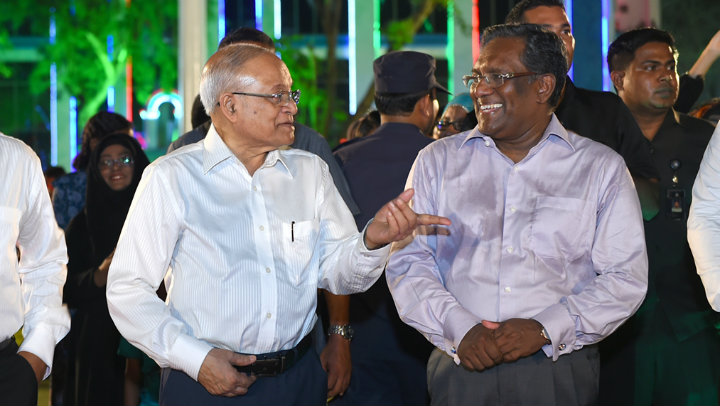
Of all the men who have served as the Maldives’ president, none have faced as many questions of legitimacy as Dr Mohamed Waheed Hassan. Having assumed power in 2012 when his boss, Mohamed Nasheed, resigned in what is widely held to be a coup d’état, he was branded a traitor or baaghee by the opposition and is regarded by many as the man who derailed the Maldives’ hard-won struggle for democracy.
In December, Waheed published a biography in Dhivehi, offering a behind-the-scenes look at key events of his life and two years in office, including the persecution of his family by former President Maumoon Abdul Gayoom, the controversial transfer of power of 2012, his humiliating defeat in the 2013 presidential elections, and decision to overstay the presidential term.
The biography is titled Insaaf or Justice, and according to Waheed, contains his version of the truth.
Its main treatise, as expected, is Waheed’s fraught relationship with Nasheed, who he blames for the turmoil that roiled the Maldives during his tenure.
What is surprising, however, is that for a man of great pride – as is evident by the series of firsts he lays claim to; the first Maldivian to obtain a PhD, the first anchor at state television, the “first Maldivian president from an ordinary family”, the first world president to stop at a Palestinian roadside café to eat a cheese pastry – Waheed portrays himself as a man caught up in political forces beyond his control. On closer inspection, it appears that Waheed takes solace in this lack of agency: He uses it to disavow responsibility for the dangerous path he set the country on. A great irony, given the promise of truth telling and accountability that the title makes.
The most notable account of Waheed’s adolescence and early political career, the subject of the biography’s first part, was the persecution of his mother soon after Gayoom assumed power in 1978. But Gayoom is spared blame.
Aishath ‘Aisa’ Moosa was sentenced for praising Gayoom’s predecessor, Ibrahim Nasir, and as she was dragged home from a summary trial, people pulled on her hair and spat on her, a process of public humiliation called gann-hingun. She was finally put on a boat with her two-month old infant and banished.
Waheed recalls: “His mother was made to board a fishing boat. When he inquired, the men on the boat said they had been asked to drop off the mother and child to Ari Atoll Mathiveri. Waheed didn’t even know of the existence of such an island. There would be no one he knew there. It was past midnight by then. Those on land could hear Aisa’s baby crying loudly from her lap. Waheed stood there overwhelmed with emotion, long after the boat had departed into the darkness, carrying his mother. His sibling’s crying affected him badly. Later, he found out that his mother stood long on the shore of Mathiveri after the boat dropped her off, with no one to take care of them.”
What exacerbates the pathos of Aisa’s fate is Waheed’s refusal to hold Gayoom and his cronies to account; government officials are described as ignorant of her mistreatment, while Gayoom, upon receiving a letter from Waheed, is said to have rang him up “within moments” to say; “I am saddened by this. I didn’t know things had taken place this way. I am working on it now”. Waheed’s family is further persecuted when he was voted into parliament in 1989, beating Gayoom’s brother-in-law, Ilyas Ibrahim. Here too, no one is held responsible for the jailing and torture that his family members suffered. Instead, Waheed suggests that the political culture of the day was to blame. Waheed then leaves the Maldives, starting off a long series of international jobs, which culminate at the United Nations.
Despite persecution in his early political career, it is with Gayoom that Waheed identifies most. Nasheed, a young firebrand politician who won the main opposition Maldivian Democratic Party’s presidential ticket and asks Waheed to be his deputy, is treated with disdain.
This clash of personalities would prove to be disastrous.
Nasheed was not presidential material, Waheed states, and even sat with his feet up on Waheed’s sofa when he visits in 2008 with the offer of the vice-presidency. At the time, Waheed had returned to the Maldives after a long spell abroad, and had founded the Gaumee Ithihaad Party. But he lacked the grass-roots support to enter the already crowded presidential field.
“Most of the public saw Nasheed as a political activist. He didn’t have the poise of someone who could be the president of the republic. He went to teashops with his friends; and did not hesitate to argue with people if he had to, even on the streets. He rode on the backs of his friend’s scooters. The MDP team did not really have anyone who had the experience of running the country. But Waheed was different. He had held high positions in the UN, and had experience in running them. He had the modesty that people have long believed should be an essential presidential quality. He lived a quiet, isolated life. His character was much like Maumoon’s [Gayoom’s]”.
The account that follows of the Maldives’ first three years of democratic rule, the subject of the second part of the book, contains little praise for Nasheed, but concerns the break-down of relations between the pair.
It begins with Nasheed reneging on Waheed’s wish to oversee the country’s foreign affairs – a demand he had made at the time he accepted Nasheed’s offer of the vice presidency. Nasheed begins telling coalition members that he suspects Waheed is against privatisation, Waheed says, and sacks the economic minister, a member of his party. There is no falling out, no words are exchanged, but a distinct cold front develops.
Waheed is then gradually side-lined.
“The president did not consult with the vice president on any important decisions, except those at cabinet meetings. The president and vice president became very distant. Some senior officials of the government did not believe that the vice president’s input was necessary. That was difficult for Waheed to experience.”
Waheed was reduced to a mere observer.
As opposition to Nasheed’s rule mounts, Waheed watches on, appearing to have no role in and ignorant of the plans of the opposition coalition that goes on to oust the country’s first democratically elected government.
That is, until Waheed assumes the presidency and forms a cabinet with members of the opposition.
He even describes the fateful meeting between himself and 15 members of the opposition, on the cusp of the 2012 coup, as an act of politeness rather than political strategy.
When the group turns up at his door-step on January 30, Waheed says he first attempted to turn them away, and “finally gives in” when Umar Naseer – who by then had called on supporters to storm the military barracks and oust Nasheed – refused to budge.
“They were the ones who spoke first. They said. ‘We have come to clear up something. If Nasheed resigns, would you resign with him? Or wouldn’t you? If the president should resign, taking over the country’s running is a responsibility that falls upon the vice president. We will continue our protests. We predict President Nasheed would have to resign. So we would like to verify if your Excellency is ready to take upon these responsibilities.’ Waheed had to think about an answer. There was no circumstance for the president to resign. And he did not believe the president would, either. And so he said. ‘I will act according to the constitution. You are all aware of the vow I took, and what the laws say about this. I have not decided to resign.’”
The final nail in the coffin for Maldivian democracy appears to be Waheed’s treatment by the cabinet afterwards. When ministers “in jeering tones” asked from the vice-president why he had met the opposition, the indignant Waheed states: “their tones, and what they were saying, displeased the vice president. He felt angry. The president just sat there listening. And then he said, ‘It is important for the vice president to answer these questions.’ Waheed said. ‘I want to answer their questions. I met them because they requested to meet me. I met to listen to what they have to say to me. Maybe I could help to find a way out of the current chaos after listening to their complaints, can’t I? I answered their questions. I didn’t voice anti-government sentiments, nor carry out anti-government activities.’ Even then they did not stop asking mocking questions. ‘We want to know then, what was said.’ Waheed’s anger increased. ‘Let me tell you. I will meet whoever I want to meet. I don’t have to be accountable to you. I too, have been elected for my post on the same ticket as President Nasheed.’”
Waheed does not see Nasheed after that.
The third part of the book begins on the eve of the police and military mutiny that lead to Nasheed’s ouster.
Waheed is home alone with his wife Ilham watching the security forces turn against his administration on television. When riot police ransack the ruling party’s headquarters, Waheed realises “that the situation was deteriorating.” But “neither the president, nor anyone in the government explained anything to him. He received no messages or phone calls.”
As the chaos continue, Waheed’s military bodyguards tell him to leave his residence for safety, but Ilham, intervenes. “No,” she says. “We don’t have to go anywhere. We stay here. Why should we leave?” Ilham calls up her brother Ilyas, who keeps the couple company, along with Yoosuf Rafeeu, a long-time friend of Waheed’s. They have a meal of faaroshi (bread husks) and black tea.
At around midnight, an arson attack is reported at the headquarters of the pro-opposition Villa TV, owned by Gasim Ibrahim of the Jumhooree Party. Waheed rings up the opposition leader “because Gasim was a long time friend and when something like that happens, one must voice one’s compassion”. Gasim curses Nasheed’s government. Then another member of the opposition, Dhiyana Saeed, Nasheed’s former Attorney General, calls him: “Shouldn’t the vice president say something now? Sitting at home like that is not acceptable.” By then, it was 2:30am. Waheed begins to write a statement, which he abandons when Naseer and Sheikh Imran Abdulla, the president of the Adhaalath Party, call him live from VTV’s studio.
Waheed condemns the attack on the station, leaving out the similar attack on the MDP Haruge, and declares: “If I can be of any assistance during the chaos, I am ready.”
Here, there is a sudden aside to the presidential palace, where Nasheed watches the same scenes with MP Mariya Didi and then-MP Alhan Fahmy. In the account of the conversation that takes place, presumably sourced from Alhan, Mariya appears ignorant, comparing Waheed to activist Billoori Moosa, “a nobody”.
The next day, Waheed takes oath.
He does not appear to hesitate or to consider any other alternative when Abdulla Shahid, the speaker of the parliament, calls him on receiving Nasheed’s resignation letter.
The subsequent narrative does not offer insights into Waheed’s thoughts at the time, instead relating events as they unfold. What follows is a condemnation of Nasheed, diplomats, the international media, everyone but himself, for the ensuing violence and turmoil.
It is Nasheed that Waheed holds responsible for the brutal beating opposition supporters suffered at the hands of the police on February 8, the day after he took oath. He says: “At such a delicate time, Nasheed coming out with so many people to face the security forces, causing them to be injured, concerned Waheed.” Notice the passive tense.
His dismissal of the police’s brutality as fiction and drama, and refusal to accept that he, as commander-in-chief, was responsible for the actions of his police force, is chilling. “There could be no arguing with the fact that some police officer’s actions were very strict,” but “Waheed understood that a lot of those actions were acted out for the photographs. With the help of a film director, some people were shown to have their heads cracked open artificially.”
The ensuing criticism and call for early elections is dismissed in a similar manner. Of the diplomats he says: “The diplomats did not know the situation of the Maldives very well. They thought that the system in the Maldives ran like a parliamentary system.” Of criticism from the international media, he says: “Nasheed had really gotten international media on his side. Waheed was familiar with MDP’s media setup inside the president’s office. They had brought in experts from overseas and had set them up in the president’s office to spread the government’s propaganda to international media. Waheed didn’t have such a team behind him. He mainly had himself.”
In the run-up to the presidential elections of 2013, Waheed is led to believe by American pollsters that he had a chance. But when the results came in, “it was difficult to believe. Waheed never believed he would get such a low result.”
He had won just five percent of the popular vote – a global low for an incumbent president.
But later, Waheed offers a different take on his loss.
When the supreme court annuls the first results, and orders a new round, the president withdraws his name. The apex court’s ruling draws international condemnation and Waheed resolves to ensure a smooth transfer of power. His running mate, Thasmeen Ali, joins Nasheed, who goes on to win 46percent of the vote in the newly held first round.
Waheed thinks: “Look at God’s will. Waheed got only five percent of the people’s support. Nasheed needed less than five percent to win. But Nasheed couldn’t bring himself to come to him. If the disrespectful, poor way he had treated Waheed wasn’t in his heart, he could have come.” The sense of schadenfreude is overwhelming.
The police and supreme court delay the second round of elections further, meaning that a new president would not be elected by the end of Waheed’s term on November 11. He comes under global pressure to resign. For days, he is indecisive.
“It was the most difficult decision of Waheed’s presidency. He paced the rooms alone. Two days before his term ended, he went to Friday prayers at the Islamic Centre. When he was at the mosque, he had just one worry. What was he do to? The Imam was Sheikh Shaheem. When he began prayers after the sermon, tears streamed out of Waheed’s eyes. He prayed to Allah for his blessings from the depths of his heart. All he wanted was to have a peaceful free and fair election, and to hand over the government to whoever was elected.
“Waheed’s heart was not biased. He felt positive towards MDP and PPM [Progressive Party of the Maldives]. All the leaders of other parties except MDP encouraged him not to resign. They sent him so many text messages. MDP called him a traitor and had made him out to be the worst individual in the country.”
In the week leading up to November 11, ambassadors and envoys from the US, UK, India and the Commonwealth lobby Waheed to resign. He recounts: “The whole week, their mission was to walk from the foreign ministry to the president’s office. They seemed like representatives of the MDP. Their narrative was the same; if he did not resign, chaos would reign in the country; the president wanted to stay in power without elections.”
The diplomats propose that the speaker of the parliament, Shahid, who by then had joined Nasheed’s MDP, take over and continue administering the country with the help of Waheed’s cabinet. The army assures Waheed they would keep peace and order if he were to resign, and Ahmed Faiz, then-Chief Justice, advises Waheed to step down if elections do not go ahead as planned.
On November 11, Waheed has two letters drafted – one announcing his resignation and another announcing that he would remain. At the last minute, his cabinet convinces him to stay on “for the sake of the country.”
But two days before the election takes place, Waheed leaves the country and is abroad when Gayoom’s half-brother Abdulla Yameen wins the presidency. He leaves out his departure, concluding the biography with a gibe at Nasheed and the MDP.
He says: “The public voted in PPM’s Abdulla Yameen as president, instead of MDP’s Mohamed Nasheed. It was a very narrow margin. Look at fate’s hand.” The biography ends there, with Waheed satisfied at the final turn of events. “It is another new start,” he states.
Even with the blessing of hindsight, Waheed describes the beginning of Yameen’s autocratic rule forgivingly. Yameen’s election is thus shown to be a fitting settlement to his rule. Without remorse, regret or acknowledgement of what he has cost the Maldivian public, Waheed’s biography is only testament to the injustice of his rule.
Related Posts
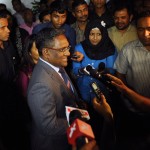 American PR firm complained over delayed payment in email to Maldives president
American PR firm complained over delayed payment in email to Maldives president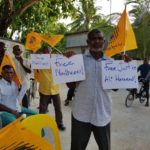 EU sanctions and the Maldives: A Q&A
EU sanctions and the Maldives: A Q&A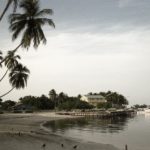 ‘Exorcism’ sparks noise pollution complaints in Kulhudhuffushi
‘Exorcism’ sparks noise pollution complaints in Kulhudhuffushi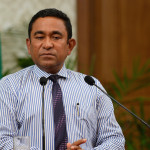 Maldives government abuses anti-terror law to silence public officials
Maldives government abuses anti-terror law to silence public officials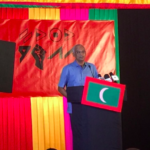 The race of his life: An introduction to the Maldives’ latest presidential hopeful
The race of his life: An introduction to the Maldives’ latest presidential hopeful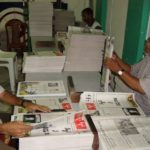 Lost in translation: the story of Haveeru
Lost in translation: the story of Haveeru

Maldives Independent suspends operations

Iyaz on Female Circumcision

EPA rejects Maafaru runway expansion project

Infrastructure development pushing islands to ‘tipping point’








